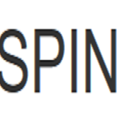Recent years have seen the emergence of non-cooperative objects in space, like failed satellites and space junk. These objects are usually operated or collected by free-float dual-arm space manipulators. Thanks to eliminating the difficulties of modeling and manual parameter-tuning, reinforcement learning (RL) methods have shown a more promising sign in the trajectory planning of space manipulators. Although previous studies demonstrate their effectiveness, they cannot be applied in tracking dynamic targets with unknown rotation (non-cooperative objects). In this paper, we proposed a learning system for motion planning of free-float dual-arm space manipulator (FFDASM) towards non-cooperative objects. Specifically, our method consists of two modules. Module I realizes the multi-target trajectory planning for two end-effectors within a large target space. Next, Module II takes as input the point clouds of the non-cooperative object to estimate the motional property, and then can predict the position of target points on an non-cooperative object. We leveraged the combination of Module I and Module II to track target points on a spinning object with unknown regularity successfully. Furthermore, the experiments also demonstrate the scalability and generalization of our learning system.
翻译:近些年来,空间出现了一些不合作的物体,如失败的卫星和空间垃圾。这些物体通常由自由浮转的双臂空间操纵器操作或收集。由于消除了建模和人工参数调整方面的困难,强化学习方法在空间操纵器的轨迹规划中显示出一个更有希望的迹象。虽然以往的研究表明它们的有效性,但它们不能用于追踪动态目标,同时使用未知的旋转(不合作物体) 。在本文件中,我们提议了一个关于自由浮转的双臂空间操纵器(FFDASM)向不合作物体运动规划的学习系统。具体地说,我们的方法由两个模块组成。模块一认识到在大型目标空间内两种终端效应的多目标轨迹规划。接下来,模块二作为输入非合作物体的点云来估计运动属性,然后可以预测非合作物体的目标点的位置。我们利用模块一和模块二的组合来成功地追踪旋转物体上不明规律的目标点。此外,实验还证明了我们学习系统的可度和一般性。




